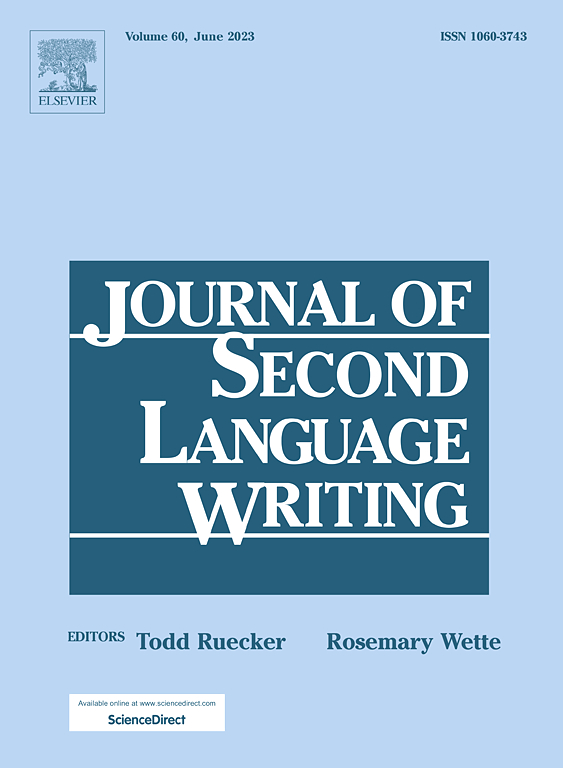Taking stock of metacognitive strategies and collaborative writing for EFL learners’ writing development
IF 4.5
1区 文学
Q1 LINGUISTICS
引用次数: 0
Abstract
It is well-documented that metacognitive instruction is significant in helping L2 learners generate written texts (Wenden, 1998; Xu, 2023). However, little is known about how metacognitive instruction in conjunction with collaborative writing interventions would contribute to learners’ individual writing development. To fill the research gap, we recruited 62 Chinese EFL learners from two classes, who were randomly allocated to either an experimental group or a control group. The experimental group received metacognitive instruction for collaborative writing before engaging in collaborative writing interventions, while the control group received normal instructions. Improvement in writing performance was gauged through three essay writing tasks sourced from the IELTS writing test bank, measuring performance across dimensions including content, organisation, vocabulary, language use, mechanics, and overall scores. Results indicated that the combination of metacognitive instruction and collaborative writing significantly enhanced participants’ individual writing scores. This study provides empirical support for the effectiveness of incorporating metacognitive instruction with collaborative writing, emphasising its positive impact on writing development and the promotion of learner self-regulation.
元认知策略与协作写作对英语学习者写作发展的影响
有充分的证据表明,元认知教学在帮助二语学习者生成书面文本方面具有重要意义(Wenden, 1998;徐,2023)。然而,关于元认知教学与协作写作干预如何促进学习者的个人写作发展,人们知之甚少。为了填补研究空白,我们从两个班招募了62名中国英语学习者,他们被随机分配到实验组和对照组。实验组在进行协作写作干预前接受协作写作元认知指导,对照组接受正常指导。写作成绩的提高是通过三个来自雅思写作题库的写作任务来衡量的,包括内容、组织、词汇、语言使用、机制和总分等方面的表现。结果表明,元认知教学与协作写作的结合显著提高了被试的个人写作得分。本研究为元认知教学与协作写作结合的有效性提供了实证支持,强调了元认知教学对写作发展和促进学习者自我调节的积极影响。
本文章由计算机程序翻译,如有差异,请以英文原文为准。
求助全文
约1分钟内获得全文
求助全文
来源期刊

Journal of Second Language Writing
LINGUISTICS-
CiteScore
8.80
自引率
13.10%
发文量
50
审稿时长
59 days
期刊介绍:
The Journal of Second Language Writing is devoted to publishing theoretically grounded reports of research and discussions that represent a significant contribution to current understandings of central issues in second and foreign language writing and writing instruction. Some areas of interest are personal characteristics and attitudes of L2 writers, L2 writers'' composing processes, features of L2 writers'' texts, readers'' responses to L2 writing, assessment/evaluation of L2 writing, contexts (cultural, social, political, institutional) for L2 writing, and any other topic clearly relevant to L2 writing theory, research, or instruction.
 求助内容:
求助内容: 应助结果提醒方式:
应助结果提醒方式:


